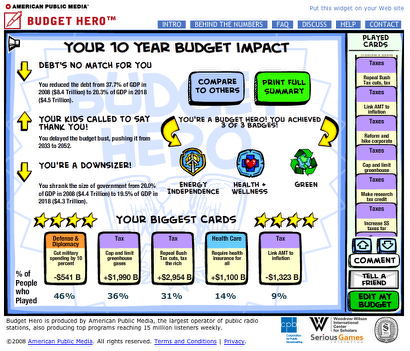SimFuture(s)
I've long been a fan of the use of games and sims as a way of working through future-facing issues. The big advantage of games as a foresight device is the capacity to fail in interesting ways: you can try out different, even bizarre, strategies for success, and do so without worry of harming yourself or others. It's a form of rehearsal, a way to understand the ways in which the present may be manipulated to create a desirable tomorrow.
Three interesting examples of simulations as rehearsal popped up on my radar recently.

Triplepundit brings word of "Oil ShockWave," an oil crisis simulation coming from the Belfer Center for Science and International Affairs at Harvard’s Kennedy School of Government. Based on a project done to educate policymakers, versions of Oil Shockwave have been run at the 2006 World Economic Forum and at the 2007 Aspen Strategy Group conference -- that is, by big-time establishment players.
This version is aimed at college instructors:
In the classroom version of Oil ShockWave, students play the roles of U.S. Cabinet members developing a policy response to a potentially devastating crisis that affects global oil supplies. Situations are presented primarily through pre-produced newscasts, video briefings and insert cards handed to the students during discussion. The exercise vividly illustrates the links between oil, the economy, and national security.The box set, called Oil ShockWave™ College Curriculum, contains maps, multimedia components, simulated newscasts, a range of background materials, and an instructor's manual.
And by "aimed at," I mean "only available to." Unfortunately, by all appearances, Oil Shockwave is only open to universities. I think Belfer Center is really missing out on a significant opportunity to educate larger communities about the dilemmas associated with resource collapse.
While "Oil Shockwave" is an interactive, immersive simulation, "Immune Attack," from the Federation of American Scientists, is a video game abstraction of how the immune system works. It's aimed at high school students, but is available to Windows users wishing to download the app. Players navigate a nanobot through a patient's bloodstream and connective tissues, trying to re-educate the immune system.
The FAS claims that playing the game increases student understanding of the immune system, but the big risk of this kind of abstraction is that it offers more of a regurgitative than an analytic understanding. Without allowing players to fiddle with the underlying systems, to make unexpected choices and see the results, it wouldn't offer any opportunities for significant insights.

The third game on the list is "Budget Hero," a simulation allowing you -- yes, you -- to adjust the parameters of the US federal spending, looking for ways to balance the budget while boosting your preferred priorities. Marketplace, the daily public radio economics and finance show, developed and sponsors the game.
Unlike some budget sims that give you nearly line-item control over what's in and what's out, Budget Hero limits your options to options that sound like policy proposals -- Cap & Limit Greenhouse Gases, Link Alternative Minimum Tax to Inflation, and so forth. You also start with three budget priority badges, reflecting the positions you take as a leader. As you can see in the screen capture, I chose Energy Independence, Health & Wellness, and "Green" (this will come as a surprise to precisely no readers). Other options include National Security, Economic Stimulus, and Safety Net.
Some policy items are conspicuous in their absence. There's nothing about NASA, for example, nor anything about funding research into specific types of non-fossil fuel energy. And I'm under no illusion that my preferred policies would have a chance of making it through any plausible Congress. Still, it's good to see that being a DFH, policy-wise, can actually be pretty economically responsible.






Comments
Jamais: if you've not come across it already, you may be interested in other sim games like PosiTech's Democracy series (http://www.positech.co.uk/) or PeaceMaker, an Israel/Palestine peace game in which you can play as either party (www.peacemakergame.com/).
Both those examples are politically oriented (PeaceMaker includes some social aspects but I'm unsure if that is random rather than modelled) but they do match the "tweak system, see what works or breaks" model that you praise in your post.
Posted by: ShaunCG | May 29, 2008 5:22 AM
Jamais,
I was very excited to read your post about the usefulness "of games and sims as a way of working through future-facing issues." I have been recently giving a lot of thought to how we could use computer simulation games, similar to SimCity or Second Life, to teach people about sustainability issues.
But then I saw Clay Shirky's talk about cognitive surplus, and I also read this post about a new online game called FoldIt, which allows players to help design new protein structures, which was the brainchild of scientist David Baker.
To me, this is sheer genius, and a clear example of harnessing the cognitive surplus, by designing a game in such a way that it solves a real-world problem while allowing the user to have fun and creatively solve a puzzle. The real power in this comes when you consider that this will allow you to "discover" people with a real, innate, talent for designing proteins who are not scientists but are regular people.
For me, I wonder what other types of problems we could solve using solutions like this. I wonder if we could apply this idea to the many unsolved sustainability problems...
Posted by: Steve Puma |
June 2, 2008 8:47 PM
|
June 2, 2008 8:47 PM
A real-world example of a global-scale game that is solving a real problem is Google Image Labeler, originally developed by Luis van Ahn as the ESP Game, which is used to label images through a two-player game, for use in Google image search.
How it works:
"You'll be randomly paired with a partner who's online and using the feature. Over a two-minute period, you and your partner will:
- View the same set of images.
- Provide as many labels as possible to describe each image you see.
- Receive points when your label matches your partner's label. The number of points will depend on how specific your label is.
- See more images until time runs out.
After time expires, you can explore the images you've seen and the websites where those images were found. And we'll show you the points you've earned throughout the session."The ultimate example of harnessing game playing/simulation to real effect is Ender's Game.
Posted by: Mark Szpakowski | June 18, 2008 3:18 AM